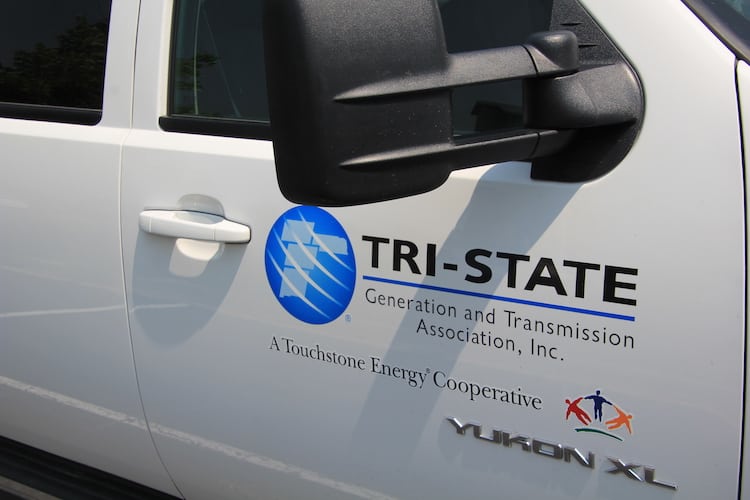Kerfuffle spurred by filings with federal agency
by Allen Best
Anger, and not just disagreement, was evident in a flurry of exchanges this week between Tri-State Generation and Transmission and its largest member, United Power.
The dispute at one level is about theformula used by Tri-State for determining how much members must pay if they want to get out of their long-term, all-requirements contracts with Tri-State. The dispute is now before the Federal Energy Regulatory Commission.
A press release distributed by Tri-State on Oct. 6 accused “certain parties, particularly United Power,” of attempting to “hijack” what Tri-State calls customary filings with the Federal Energy Regulatory Commission.
“United Power’s actions questioning the continued importance of long-term, full-requirements power contracts undermine their value and threaten the nation’s generation and transmission cooperative model,” said Duane Highley, chief executive officer of Tri-State.

Mark Gabriel
Asked for comment, Mark Gabriel, United’s chief executive, called the press release “childish and immature.”
“It’s factually incorrect, and that is sad, because I would never believe that misleading people is a good practice,” he added.
This is a messy story. For those unfamiliar with the contours, here is the abridged version:
As Tri-State resisted the shift from coal to renewables, first Kit Carson Electrical Cooperative and then Delta-Montrose Electric left—after first paying exit fees to allow them to leave their all-requirements contracts.
United Power and La Plata Electric, the first and third largest cooperatives, were slower to eye the door and their contracts go longer, to 2050. But when they asked what it would cost to get out of their contracts, Tri-State supplied outlandish figures. In other words, married for life—don’t think about divorce.
To avoid having Colorado regulators oversee this dispute, Tri-State sought jurisdiction from the Federal Energy Regulatory Commission. It says it was for other reasons, because it operates in four states and not just one.
Tri-State is correct that it needs certainty for resource and other planning. It’s tough to make billion-dollar decisions when you don’t know whether you will lose a third or more of your business. But whether Tri-State is changing rapidly enough to reflect the changing energy market is the background issue that looms over this dispute about the filings in Washington D.C.
Now—as Gabriel points out—8 electrical cooperatives want to get exit fee numbers—how much it would take to break their contracts—from Tri-State. Not any of them have indicated they want to leave. Rather, they want to get an idea of where they stand with their options.
United is by far the single largest member of those co-ops, alone responsible for 19% of Tri-State’s annual revenues. But the others—including Windsor-based Poudre Valley Electric, Durango-based La Plata and five others in Colorado, Nebraska and New Mexico—together account for 40% of Tri-State’s annual revenues.
The all-requirements contract is a misnomer in that it requires the co-ops to get 95% of their power from Tri-State. But United and other members chafed, and so Tri-State created a somewhat more flexible policy.
Gabriel says United doesn’t want out of Tri-State, but it wants Tri-State to change more rapidly and offer even more flexibility. “We have 7,000 solar rooftops, 3,800 EVs and 100 storage batteries in our service territory,” he says. United and other distribution cooperatives will be the aggregators of distributed energy resources in the future, and not Tri-State and other G&Ts.
This is from Big Pivots 46, an e-journal concerning the energy and water transitions in Colorado adn beyond. Please consider subscribing.
Tri-State officials represent the dispute in a different way.
“Our filings represent our members’ collaborative work to ensure that if one member desires to terminate its contract early, it has the flexibility to do so while the other embers remain unharmed,” said Tim Rabon, chairman of Tri-State’s board of directors, in the press release.
“Increased contract flexibility, along with lower wholesale rates, cleaner energy and reduced emissions, are central to delivering value to our members and their rural consumers through our Responsible Energy Plan. But flexibility can’t mean that the rest of the members, and ultimately their customers, are left holding the bag,” added Rabon, who is from a member electric cooperative in New Mexico.
For more background on this dispute, see May 5 story: United Power alleges Tri-State G&T crossed legal liens to “imprison’ it in supply contract to 2050.
Also see: Can Tri-State and other G&T’s serve a useful purpose in the fast-changing world of energy?
Why support Big Pivots?
You need and value solid climate change reporting, and also the energy & water transitions in Colorado. Because you know that strong research underlies solid journalism, and research times take.
Plus, you want to help small media, and Big Pivots is a 501(c)3 non-profit.
Big grants would be great, but they’re rare for small media. To survive, Big Pivots needs your support. Think about how big pivots occur. They start at the grassroots. That’s why you should support Big Pivots. Because Big Pivots has influence in Colorado, and Colorado matters in the national conversation.
- How much water remains in southeast Colorado’s aquifers? - April 18, 2024
- Keeping water rights on the Yampa while utilities figure out future technologies - April 18, 2024
- How can Colorado add this much renewable energy by 2040? - April 18, 2024





